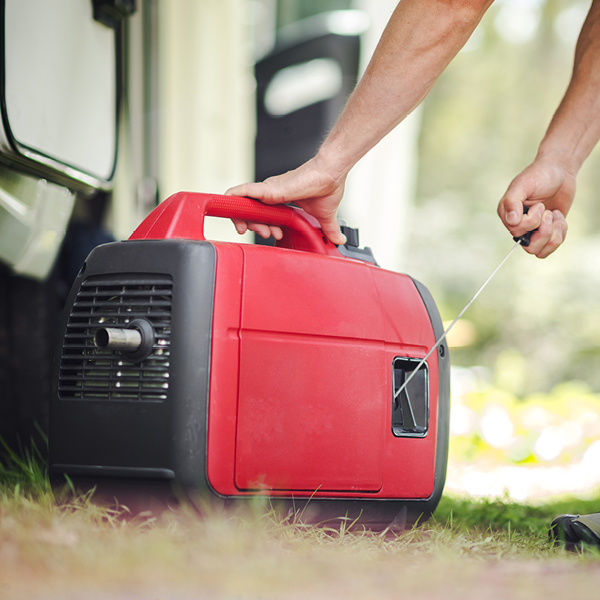How to Select a Portable Generator
Having a reliable generator can make all the difference, but it’s essential to consider where and how you plan to use it since selecting the right portable generator depends on your specific needs.
In residential areas, particularly during power outages, quieter generators are often preferred to minimize disturbance to neighbors. In camping or outdoor settings, lower decibel ratings are also desirable for a more pleasant experience.
Then, when it comes to events and commercial use, you should consider the additional accessories you may need for safety measures.
Determine Wattage Needs
First, you need to determine the power requirements for the items you need to use. Portable generators come in various shapes and sizes, equipped with different features to suit diverse situations. Ranging from 2.5KW to a mega 350KW, these generators serve purposes from temporary power to emergency power, catering to both small gatherings and large outdoor events. The versatility of these generators is evident in their presence at Batabano, Taste of Cayman, the World Open Squash tournament, Sunset Bay, construction sites, and many more locations.
To start, make a list of the appliances and devices you’ll need to power during an outage or while off-grid. Consider their wattage requirements and prioritize essential items such as refrigerators, lights, heating systems, and medical equipment. Utilize this power selection worksheet for assistance in calculating wattage needs.
Be sure to select a generator with a capacity that exceeds your total wattage requirements to accommodate potential surges and fluctuations in power demand.
Consider All Costs
After defining your budget range to align with the diverse generator prices offered, don’t forget to look at the ongoing costs. Beyond the purchase or rental fee, factor in costs for delivery, collection, power distribution accessories, and fuel. Rental generators are supplied fully fueled, with a fuel deposit that needs replenishing before returning.
For fuel costing, you can contact a member of our team, use an online fuel calculator, or follow a formula to multiply the generator’s fuel consumption rate (GPH or LPH) by the number of hours you expect to run the generator.
For example, if a generator consumes 0.5 gallons of fuel per hour and you plan to run it for 8 hours you’d need 4 gallons:
Total Fuel Consumption= 0.5GPH × 8 hours = 4gallons
Consider Hook-Up Method Needs
Larger generators do not simply plug into the piece of equipment that you would like to power. They require a connection to a breaker box to prevent accidental backfeeding into utility company lines. Ensure you have the necessary power distribution accessories when purchasing or renting, including heavy-duty extension cords with the appropriate amperage rating to connect the generator to your devices.
Choose Tools to Protect From Outdoor Elements
While you may consider weatherproof covers to protect the generator and power distribution equipment from the elements, particularly rain, keep in mind that all of the accessories should be fit for the occasion. Ensure your extension cords, power strips, and outlets are suitable for outdoor use, if needed, as an extra layer of protection against electric shock. Plus, cable ramps or protectors help prevent tripping hazards and protect the generator cables from damage when they need to cross walkways or roads.
Check Outlets and Port Options
Check the number and type of outlets on the generator to ensure they fit your needs, including sufficient AC and DC outlets to accommodate your devices. Some generators also come with USB ports for charging electronics directly too.
Determine Noise Level Allowed
Pay attention to the noise level produced by the generator. Inverter generators are generally quieter than conventional ones. If noise is a concern, choose a model with a lower decibel rating.
The decibel scale is logarithmic, meaning that a small change in decibel level represents a significant change in perceived loudness. For example, a generator with a rating of 70 dB is noticeably quieter than one with a rating of 80 dB.
Here are general guidelines to understand the noise levels associated with different decibel ratings:
- 50-60 dB: Considered relatively quiet. This level of noise is comparable to a normal conversation at home.
- 70 dB: Moderate noise level. It may be noticeable but not overly disruptive. This is a common noise level for many portable generators.
- 80 dB: Considered loud. It may be disruptive in residential areas, and prolonged exposure can be fatiguing.
- 90 dB and above: Very loud. Prolonged exposure to noise at this level can be harmful and is generally not suitable for residential use.
